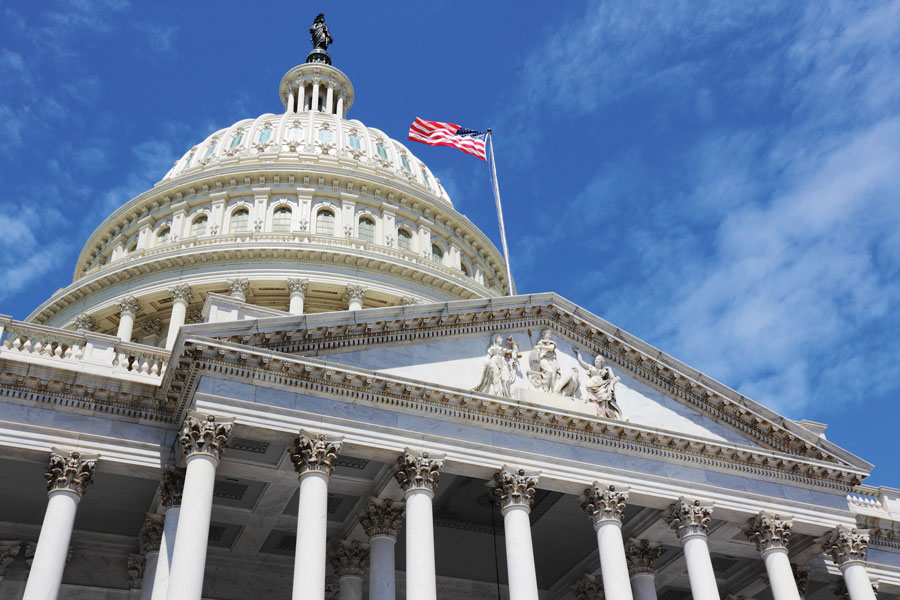

House Democrats from high-tax states celebrated the inclusion of a more generous state and local tax deduction in the House-passed version of President Joe Biden’s economic plan, but they face some intensive negotiations on its final form as the Senate takes up the bill.
“Nobody thought we would get this far. There was a lot of skepticism,” Rep. Tom Suozzi, a New York Democrat, said. “So it’s a major victory and we’re gonna keep on pushing to make sure it gets done all the way and signed by the president.”
The legislation that passed the House Friday calls for raising the cap on state and local tax deductions, or SALT, to $80,000, up from the $10,000 limit imposed in former President Donald Trump’s 2017 tax law. The SALT deduction on federal taxes is one of the most controversial aspects of the legislation, but also politically important for many members representing high-tax areas, including New Jersey, New York and California.
Advocates for SALT say the language will restore tax breaks for middle-income households in high-tax areas, and will help keep wealthy taxpayers from fleeing to lower-tax areas.
“There is no pathway for this bill without addressing these types of issues,” said Rep. Mikie Sherrill, a New Jersey Democrat, citing House Speaker Nancy Pelosi’s support for the SALT expansion. “She understands how this is hurting families and I think we have a great pathway forward.”
Critics, including Republicans and some progressive Democrats, say that the House approach to expanding the write-off gives too much away to wealthy Americans without doing enough to help middle-class households. Sens. Bernie Sanders and Bob Menendez are developing an alternative proposal to address that complaint.
The Senate plan would cap the SALT deduction based on income, allowing unlimited write-offs for those earning less than about $400,000 and then phasing down the deduction for those earning more. Sanders, a Vermont Independent who caucuses with Democrats, and Menendez, a New Jersey Democrat, say they are still fine-tuning the specifics.
“I hope Bernie changes the SALT tax,” said Rep. Alexandria Ocasio-Cortez, a progressive Democrat from New York, adding that she hopes the Senate also expands immigration proposals to allow for a pathway to citizenship. “I think that aside from that, 90% of the bill is locked in.”
Republicans have attacked the legislation for providing large tax cuts to the wealthy, despite Democrats’ calls for top earners to shoulder more of the burden. About 94% of the SALT benefits in the House’s $80,000 cap proposal would go to the top 20% of earners — or those earning about $175,000 or more. In the Senate plan for unlimited SALT benefits under $400,000 in earnings, about 88% would go the top fifth of U.S. households, according to data from the Urban-Brookings Tax Policy Center data.
Rep. Tom Malinowski, a New Jersey Democrat, said the House SALT proposal has widespread benefits among families that are middle-class in his part of the country, but acknowledges that households at the top end of the income spectrum also benefit.
“It’s every homeowner in my district,” he said. “Obviously, it’s also the very wealthy and that’s inescapable.”
Malinowski said the House and Senate have different approaches on SALT, but they are working toward a common goal, and that there’s the possibility for the two plans to be merged.
The Senate is likely to begin working on the legislation after the Thanksgiving holiday. Democrats are aiming for Biden to sign the bill into law before the end of the year.

A new proposal could end the ban on promoting client reviews in states like California and Connecticut, giving state-registered advisors a level playing field with their SEC-registered peers.

Morningstar research data show improved retirement trajectories for self-directors and allocators placed in managed accounts.

Some in the industry say that more UBS financial advisors this year will be heading for the exits.

The Wall Street giant has blasted data middlemen as digital freeloaders, but tech firms and consumer advocates are pushing back.

Research reveals a 4% year-on-year increase in expenses that one in five Americans, including one-quarter of Gen Xers, say they have not planned for.
Orion's Tom Wilson on delivering coordinated, high-touch service in a world where returns alone no longer set you apart.
Barely a decade old, registered index-linked annuities have quickly surged in popularity, thanks to their unique blend of protection and growth potential—an appealing option for investors looking to chart a steadier course through today's choppy market waters, says Myles Lambert, Brighthouse Financial.
